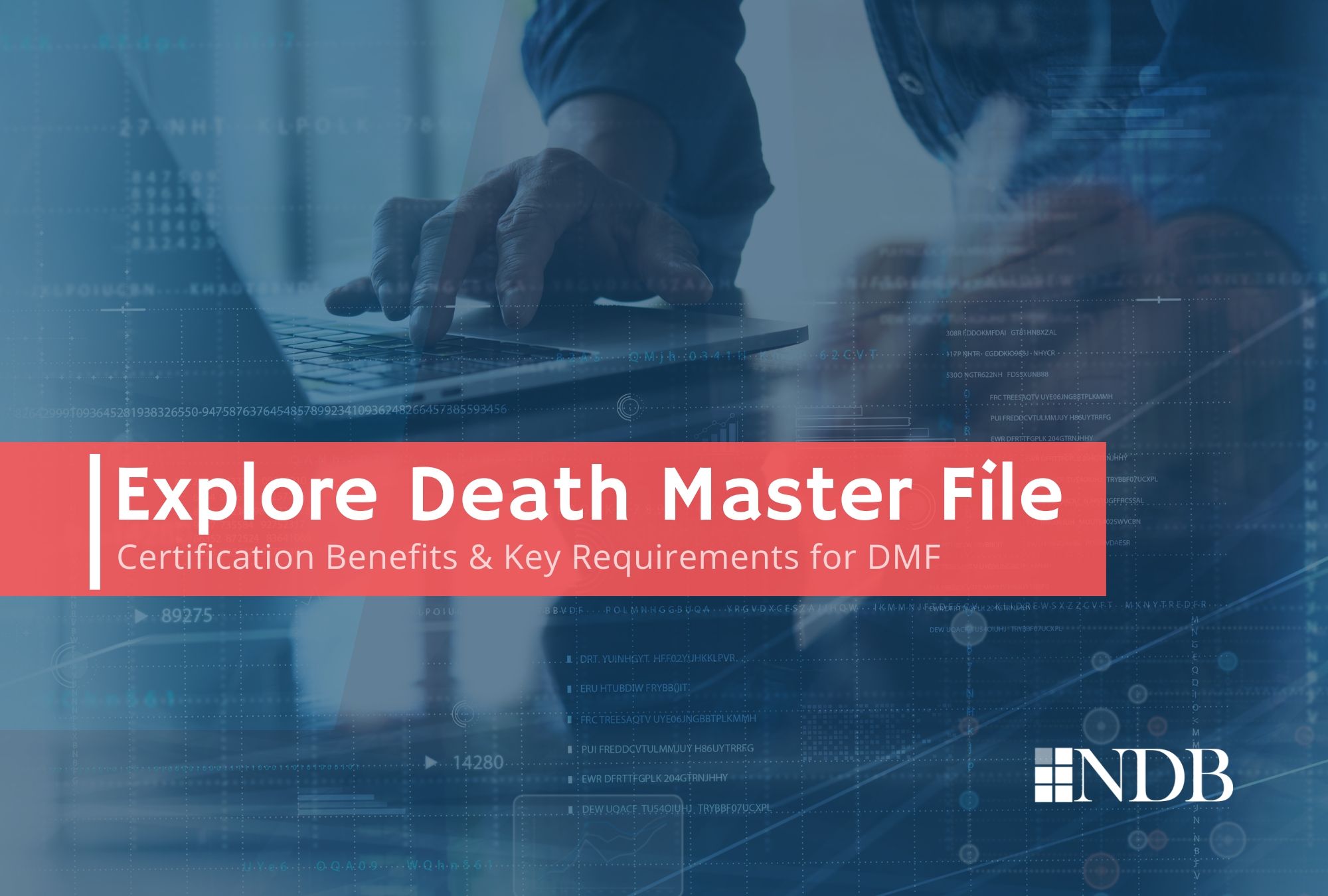DMF Certification and Strategic Benefits
The Death Master File (DMF) is an essential resource filled with crucial information about individuals who have passed away. Accessing this data requires navigating a rigorous certification process that prioritizes data security and privacy. However, successfully obtaining certification can provide significant benefits, such as facilitating business growth, ensuring regulatory compliance, and enhancing fraud protection.
The Significance of DMF Certification
DMF certification not only boosts your organization’s credibility but also fortifies your fraud prevention strategies and helps maintain compliance with regulatory standards. This guide will walk you through the DMF certification journey, covering eligibility criteria, application steps, and the review process overseen by the Social Security Administration (SSA).
What is the Death Master File?
The Death Master File (DMF), managed by the SSA, serves as a critical asset across various sectors, including business, government, and research. It contains vital details like names, Social Security numbers, birth and death dates, and last known addresses of deceased individuals. Organizations can utilize this data to verify deaths, prevent identity fraud, manage benefits, and conduct essential statistical research.
How is DMF Data Used?
Accessing DMF data requires strict adherence to SSA regulations, as the management of sensitive information entails significant responsibility. Organizations must demonstrate a legitimate need for this data through a detailed certification process. Once certified, they can harness DMF data for numerous purposes, including verifying deaths, detecting fraud, and ensuring regulatory compliance. However, it’s important to be aware of potential risks, such as data breaches, and to implement robust security measures to safeguard this information.
The SSA's Role in DMF Management
The SSA is instrumental in maintaining the DMF by collecting death reports from various sources, including funeral homes and state agencies. These reports are carefully verified and incorporated into the DMF, ensuring accuracy and reliability. The SSA also oversees access to DMF data, managing the certification process for organizations seeking this critical resource.
Tech's Impact on DMF Management
Advancements in technology are transforming how DMF data is managed and utilized. Artificial intelligence (AI) enhances data analysis capabilities, allowing for more effective identification of patterns and anomalies. This technology significantly improves fraud detection, risk assessment, and identity verification.
Furthermore, blockchain technology offers a revolutionary approach to DMF management by ensuring secure and transparent storage of sensitive information. By employing blockchain, organizations can maintain the integrity of DMF records, reducing the risk of unauthorized access or tampering.
Innovations in data analytics and machine learning further empower organizations to extract valuable insights from DMF data, facilitating informed decision-making and operational optimization.
Navigating the DMF Certification Process
Organizations pursuing DMF certification must adhere to stringent eligibility criteria established by the SSA. This process includes an assessment by an accredited conformity assessment body (ACAB) to ensure that the organization possesses the necessary infrastructure to protect DMF information. Notably, a third-party attestation is required every three years.
Key Requirements for DMF Certification
-
Legitimate Need
Organizations must provide valid reasons for accessing DMF data, ensuring that only those with lawful purposes—such as managing benefits or processing claims—are granted access. -
Compliance with Privacy Standards
Organizations must follow SSA privacy and security protocols, implementing robust measures to protect sensitive data and comply with relevant laws. -
Ethical Data Practices
Organizations must commit to ethical standards when using DMF data, including obtaining consent and maintaining accurate records.
Application Process
To apply for DMF certification, organizations need to compile comprehensive documentation outlining their intended use of DMF data, internal security measures, and regulatory compliance. This documentation serves as proof of their commitment to protecting sensitive information.
SSA Review & Certification Issuance
The SSA conducts a thorough review of each application, involving documentary checks, audits, and interviews to assess eligibility for DMF certification. Successful applicants receive certification, granting authorized access to DMF data for legitimate purposes. However, ongoing compliance is essential, as the SSA may perform periodic audits to ensure adherence to security standards.
Benefits of DMF Certification
-
Increased CredibilityCertification reflects a commitment to responsible data management, enhancing trust with stakeholders and clients.
-
Regulatory ComplianceAchieving certification helps organizations comply with industry standards, avoiding costly penalties and demonstrating a dedication to ethical practices.
-
Enhanced Fraud PreventionAccess to DMF data significantly improves organizations’ abilities to prevent fraud, verify identities, and protect against identity theft.




